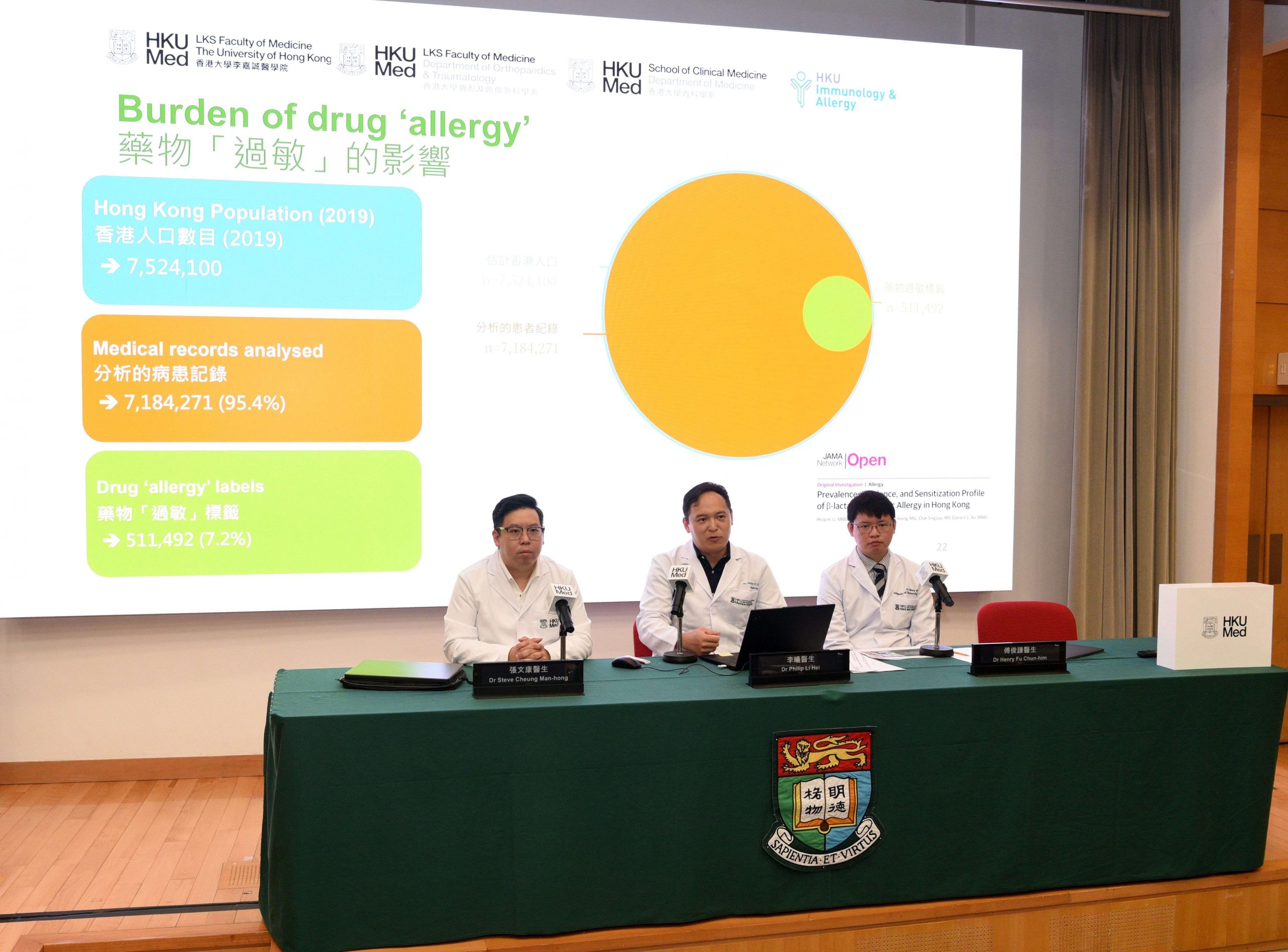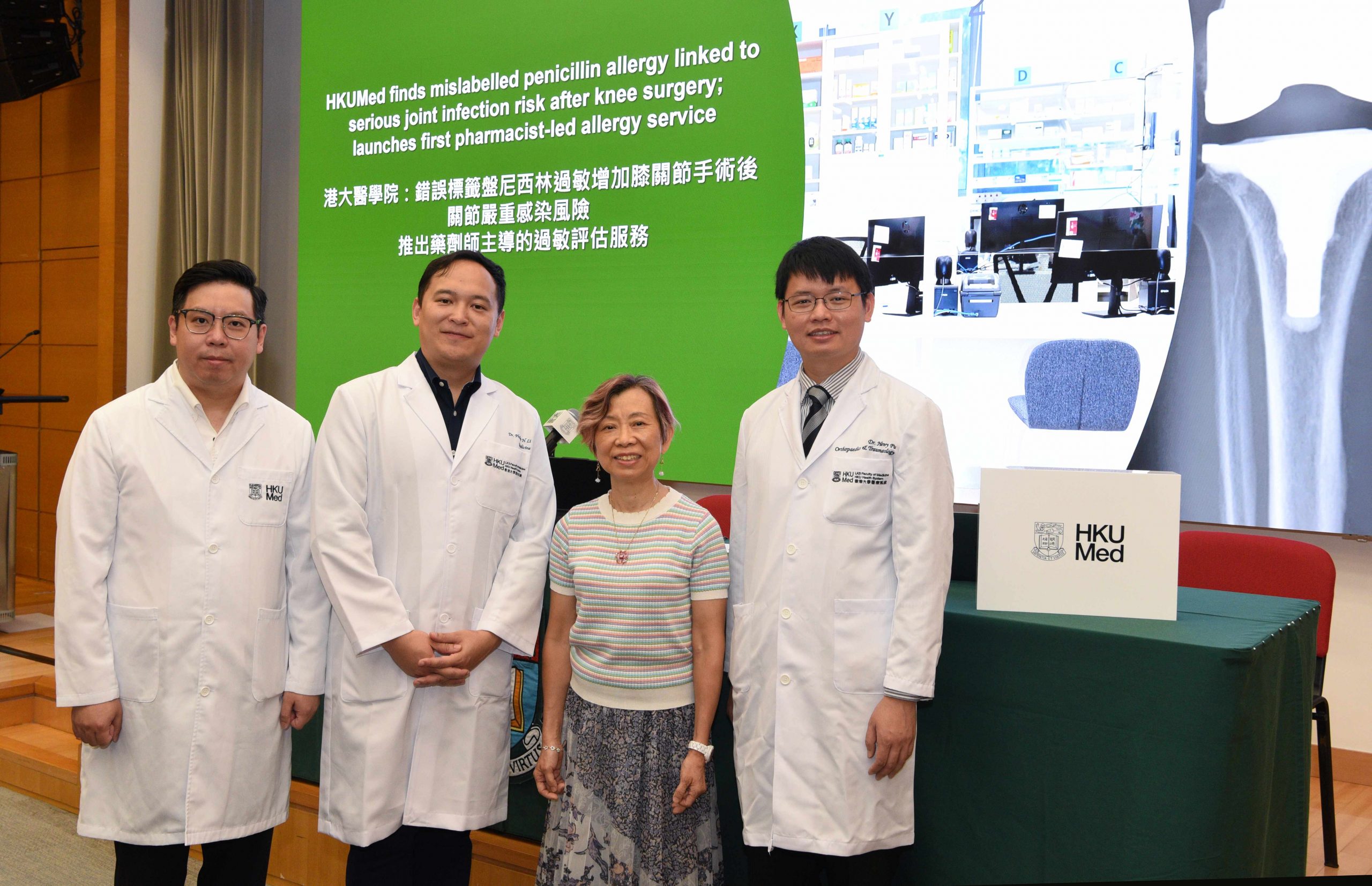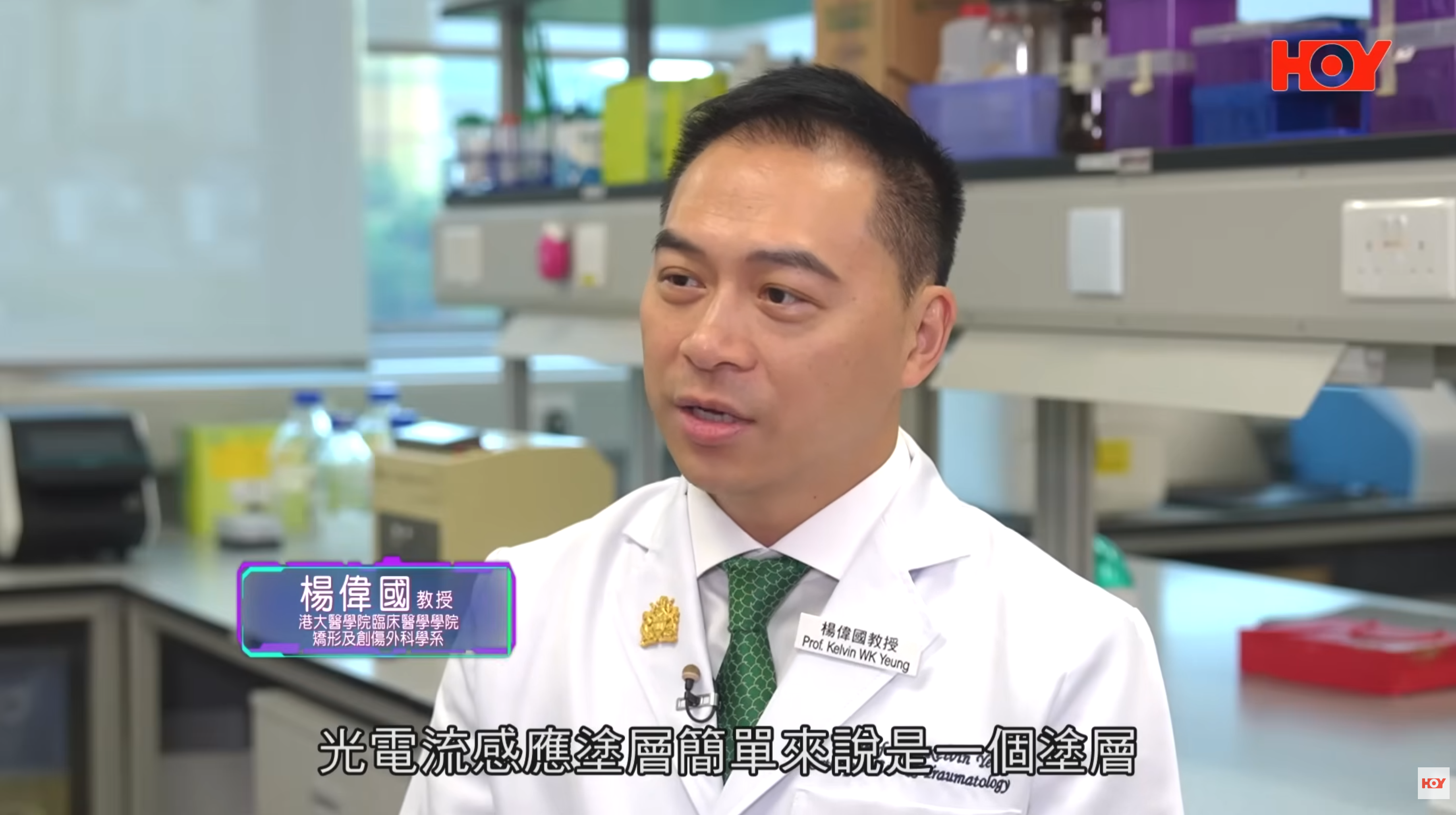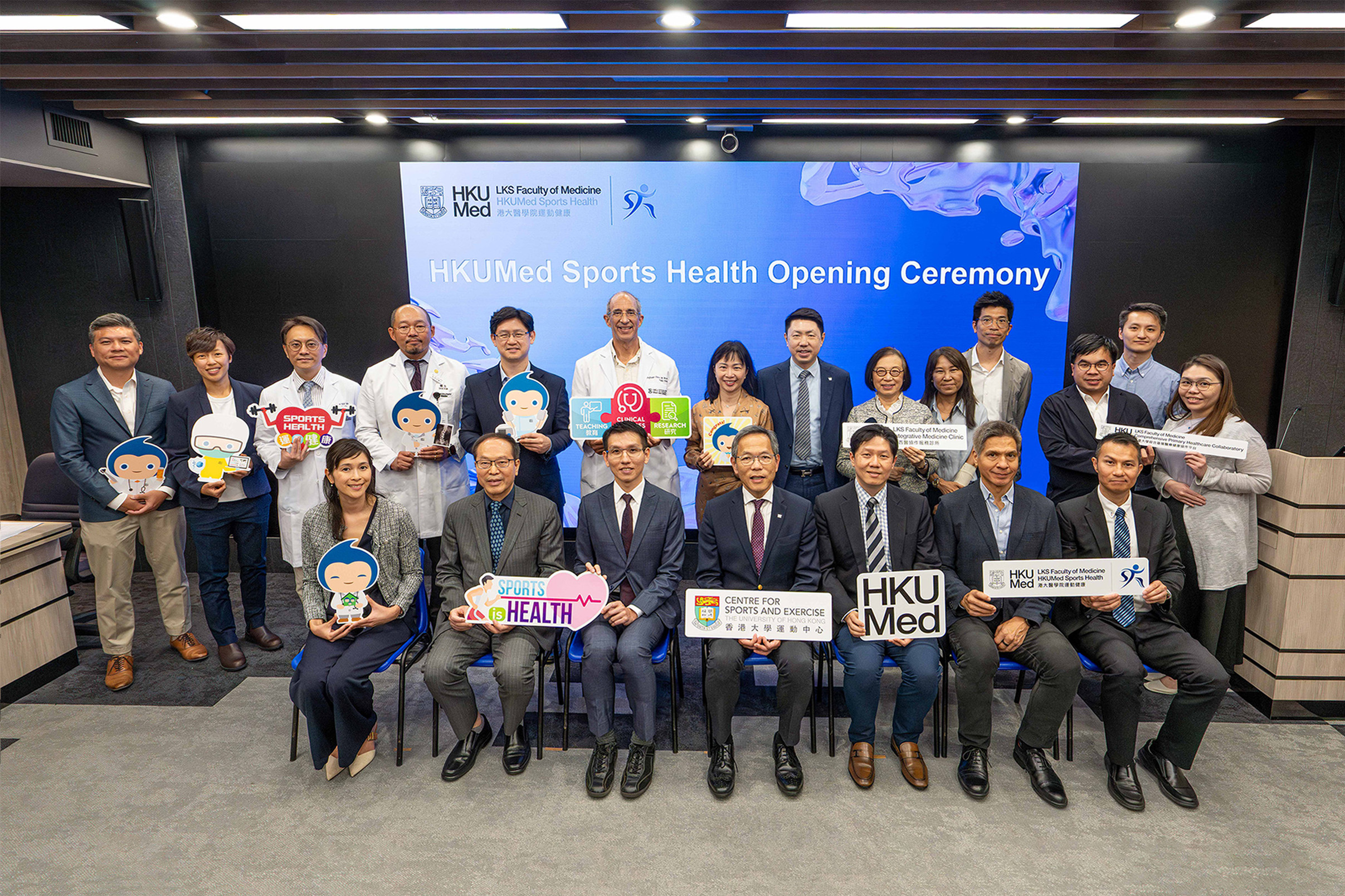HKUMed finds mislabelled penicillin allergy linked to serious joint infection risk after knee surgery; launches first pharmacist-led allergy service
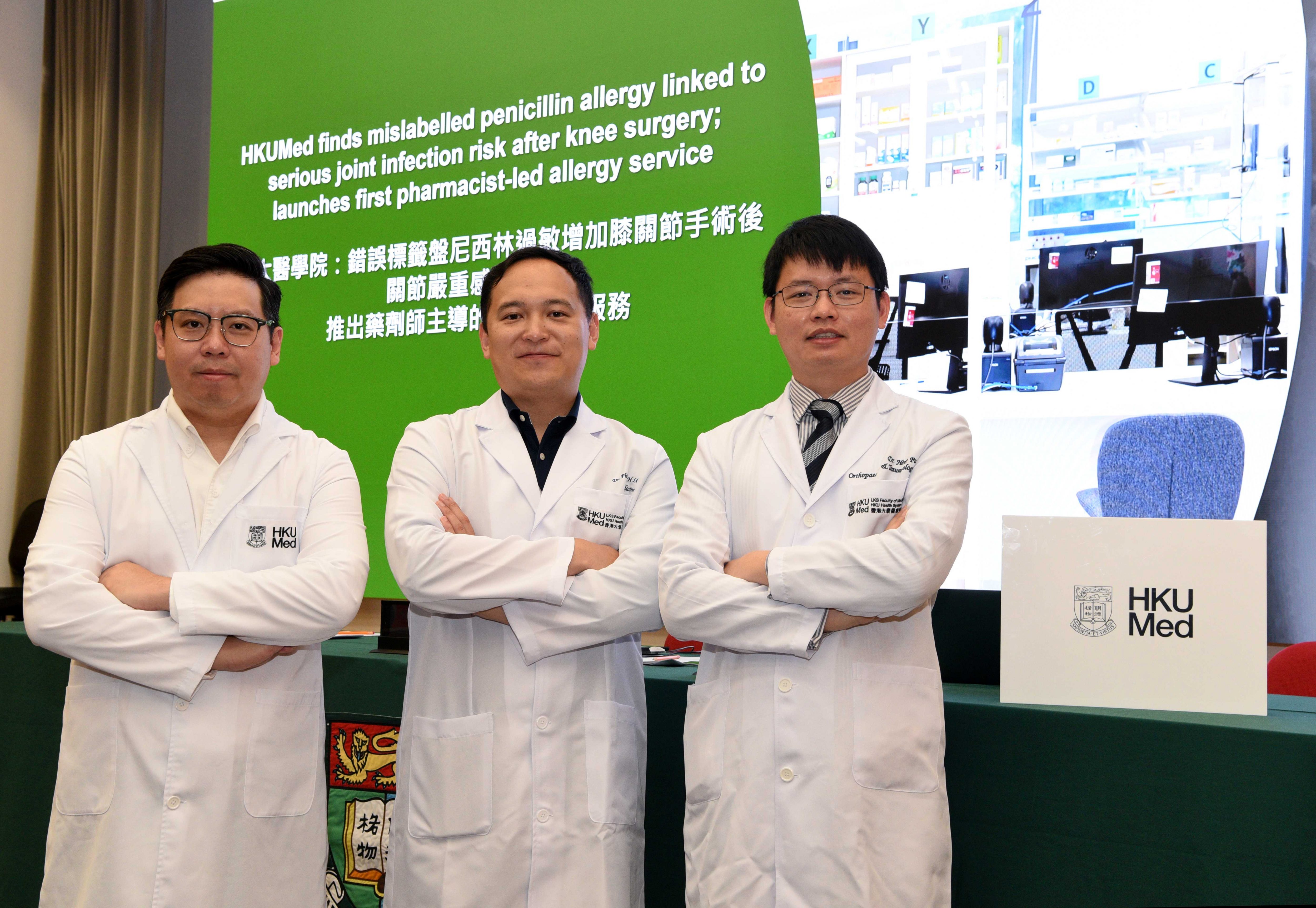
20 August 2025
A research team led by the Department of Medicine and the Department of Orthopaedics and Traumatology, under the School of Clinical Medicine, LKS Faculty of Medicine of the University of Hong Kong (HKUMed), has uncovered a serious risk of joint infection following knee surgery, linked to allergy mislabelling. The study showed that patients incorrectly labelled as allergic to penicillin or other beta-lactam (BL) antibiotics face a significantly higher chance of developing periprosthetic joint infection (PJI) — a painful and costly infection that can arise following joint replacement surgery, which can also lead to major complications. This revelation has prompted the launch of Hong Kong’s first research-focused pharmacist-led pilot service for penicillin allergy assessment at HKUMed, aimed at addressing this critical healthcare issue. The research, underscoring the importance of accurate allergy documentation, was published in The Bone & Joint Journal [link to publication].
A hidden danger: 90% of allergy records are incorrect
Penicillin and related BL antibiotics are among the most effective medicines for treating bacterial infections. However, patients who are labelled as allergic often receive alternative medications that are less effective and carry greater risks. In Hong Kong, about 2% of the population, over 140,000 people, are recorded as having a penicillin or BL allergy. Alarmingly, previous studies have found that up to 90% of these allergy labels are incorrect, leaving many patients at risk of receiving less effective and potentially harmful treatments.
Dr Philip Li Hei, Division Chief of Rheumatology & Clinical Immunology and Clinical Assistant Professor from the Department of Medicine under the School of Clinical Medicine at HKUMed, explained: ‘Many of these incorrect allergy labels were documented in patients’ medical records decades ago — perhaps based on childhood reactions such as a rash, or on inappropriate skin tests done outside Hong Kong. Unfortunately, these outdated records prevent patients from receiving optimal care, particularly when it comes to critical surgeries like knee replacements.’
Mislabelled allergies triple the infection risk in knee replacements surgery
The research team analysed over 4,700 knee replacement procedures performed at Queen Mary Hospital between 1993 and 2021 and found the patients identified as having penicillin allergy were three times more likely to develop an infection. More importantly, the presence of a penicillin allergy label was identified as an independent risk factor for PJI, increasing the likelihood of infection by nearly fivefold. This heightened risk is associated with a range of adverse outcomes, including mandatory use of second-line antibiotics, longer hospital stays, increased mortality, higher healthcare costs, and the development of multidrug-resistant organisms.
‘This study provides the first large-scale evidence from Hong Kong showing the serious consequences of mislabelled penicillin allergies,’ said Dr Steve Cheung Man-hong, Honorary Clinical Assistant Professor in the Department of Orthopaedics and Traumatology under the School of Clinical Medicine at HKUMed. ‘These infections are not only painful and life-threatening, they also necessitate additional surgery and long-term antibiotic treatment, and place a heavy burden on our healthcare system.’
New service for safer patient outcomes
To address the urgent need for better drug allergy assessments, HKUMed has launched a new research-focused pharmacist-led penicillin allergy assessment pilot service. This service allows patients to directly access expert evaluations at the research-based HKU Community Pharmacy without requiring a prior referral from a doctor. Specially trained pharmacists will conduct initial assessments, and if further evaluation is required, patients can be seamlessly referred to an allergist — all within a coordinated and integrated care pathway.
This streamlined and accessible approach not only improves patient care but also helps reduce the burden on hospital-based allergy clinics, which are often overwhelmed by high demand. By empowering pharmacists to play a central role in identifying and managing mislabelled allergies, HKUMed’s initiative sets a new standard for community-based allergy care in Hong Kong.
‘This initiative is not just about correcting a label,’ said Dr Philip Li Hei. ‘It’s about ensuring that patients receive the safest and most effective care possible. Our pharmacist-led model makes allergy evaluation more accessible and efficient, especially for patients who urgently need antibiotics, such as those awaiting surgery.’
Ensuring optimal care: A commitment to patient
‘Our goal is to ensure that every patient enters surgery with the safest and most effective treatment plan available,’ said Dr Henry Fu Chun-him, Division Chief of Joint Replacement Surgery and Clinical Assistant Professor in the Department of Orthopaedics and Traumatology under the School of Clinical Medicine at HKUMed. ‘Correcting inaccurate allergy labels is a simple yet important step that can make a big difference in patient outcomes.’
HKUMed encourages the public to review their medical records, particularly if they have unverified penicillin allergy labels. With proper testing, many patients can safely receive first-line treatments that provide offer better protection against infections.
About the research team
This interdisciplinary study was led by Dr Philip Li Hei, Clinical Assistant Professor, Department of Medicine, and Dr Steve Cheung Man-hong, Honorary Clinical Assistant Professor, Department of Orthopaedics and Traumatology, both from the School of Clinical Medicine, HKUMed. The research team also included Dr Valerie Chiang from Queen Mary Hospital; and Dr Henry Fu Chun-him, Dr Amy Cheung Yim-ling, Professor Peter Chiu Kwong-yuen and Dr Michelle Luk, from the Department of Orthopaedics and Traumatology, School of Clinical Medicine, HKUMed.
More on:
港大醫學院:錯誤標籤盤尼西林過敏增加膝關節手術後關節嚴重感染風險 推出藥劑師主導的過敏評估服務
2025年08月20日
香港大學李嘉誠醫學院(港大醫學院)臨床醫學學院的内科學系與矯形及創傷外科學系研究團隊發現,過敏標籤錯誤與膝關節手術後出現嚴重人工關節感染的風險有關。研究顯示,若病人被誤標為對盤尼西林或β-內酰胺(Beta-lactam)抗生素過敏,他們發生人工關節感染的機會顯著增加。這種感染不僅會造成病人術後劇烈疼痛,更可能導致嚴重併發症,治療成本亦高昂。有見及此,港大醫學院已推出全港首個藥劑師主導的盤尼西林過敏評估先導研究服務,以應對這個重要的醫療問題。新服務強調準確記錄病人過敏資訊的重要性,有關研究結果已在《The Bone & Joint Journal》上發表(按此瀏覽期刊文章)。
潛在危機:九成過敏標籤不正確
盤尼西林及相關的β-內酰胺抗生素是治療細菌感染最有效的藥物之一。然而,被標籤為對以上藥物過敏的病人,往往會被處方效果較差、風險較高的替代藥物。在香港,約有2%人口(超過14萬人)被標籤為對盤尼西林或β-內酰胺抗生素過敏。令人震驚的是,過往研究顯示,多達九成的過敏標籤是錯誤的,導致許多病人需接受療效較差甚至有害的治療。
港大醫學院臨床醫學學院内科學系風濕及臨床免疫科主管兼臨床助理教授李曦醫生解釋:「許多錯誤的『過敏』 標籤,其實是在病人年幼時因出現皮疹反應而記錄下來,也可能是根據在香港以外地區進行不當的皮膚測試而作出的判斷。這些過時的標籤往往阻礙了病人獲得最佳治療,尤其在進行如膝關節置換等重大手術時更為關鍵。」
錯誤過敏標籤致膝關節置換術後感染風險增加三倍
研究團隊分析了1993至2021年期間在瑪麗醫院進行的逾4,700宗膝關節置換手術的數據,發現被標籤為盤尼西林過敏的病人,其術後感染風險是一般患者的三倍。更重要的是,研究確認盤尼西林過敏標籤是人工關節感染的獨立風險因素,令感染風險增加五倍。這與多項不良結果有關,包括病人須使用二線抗生素、延長住院時間、死亡率上升、醫療費用增加,以及出現多重抗藥性病原體。
港大醫學院臨床醫學學院矯形及創傷外科學系名譽臨床助理教授張文康醫生表示:「這項研究是本港首個大型實證,證明錯誤標籤盤尼西林過敏可導致嚴重的後果。這些感染不僅引起痛楚,甚至危及生命,病人還可能需要進行額外手術、長期使用抗生素,對醫療系統構成沉重負擔。」
嶄新藥劑師評估服務 提升用藥安全
鑑於藥物過敏評估的需求迫切,港大醫學院推出全新的藥劑師主導、以研究為本的盤尼西林過敏評估先導服務。患者無需醫生轉介,即可直接前往港大社區藥房接受專業評估。受過專業訓練的藥劑師會進行初步評估,如有需要,患者可獲直接轉介至免疫科醫生作進一步檢查,整個流程完善且協調良好。
這種優化模式不僅提升了病人的整體就診體驗,亦有助減輕醫院過敏門診的龐大需求。港大醫學院的新舉措讓藥劑師在識別和管理錯誤過敏標籤方面發揮主導作用,為香港的社區過敏護理服務樹立新標準。
李曦醫生表示:「這項新服務不僅能夠更正錯誤標籤,更可以確保病人獲得最安全、最有效的治療。藥劑師主導模式讓病人能夠更快捷有效地接受過敏評估,對於急需使用抗生素的病人,如正準備接受手術的患者尤為重要。」
以病人為中心 提供最佳的治理
港大醫學院臨床醫學學院矯形及創傷外科學系關節置換手術部主管兼臨床助理教授傅俊謙醫生強調:「我們的目標是確保每位病人在手術前都能夠得到最安全、最有效的治療方案。更正錯誤的過敏標籤只是簡單的一步,卻對病人的治療效果有重大的影響。」
港大醫學院鼓勵公眾檢視自己的病歷,特別是那些未經驗證的盤尼西林過敏標籤。透過正確測試後,許多病人可以安全使用一線治療藥物,從而更有效預防感染。
關於研究團隊
這項跨學科研究由港大醫學院臨床醫學學院內科學系臨床助理教授李曦醫生和矯形及創傷外科學系名譽臨床助理教授張文康醫生領導。研究團隊包括瑪麗醫院姜穎彤醫生,以及港大醫學院臨床醫學學院矯形及創傷外科學系傅俊謙醫生、張炎鈴醫生、曲廣運教授及陸曉恩醫生。
更多內容


